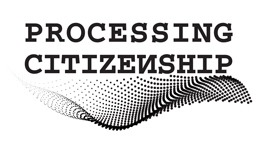Open call to seminar “Digitizing Peoples in Uncertain Times: Interface methods for interventions on populations”

13 and 14 May 2021, University of Bologna/Virtual
We invite interested scholars to contribute with empirical and conceptual works at the confluence of studies on data-driven population management, digital sociology and its methods, or STS and interventionist approaches, including ethnographic works.
Deadline for abstract submission: March 30th, 2021
300-word abstracts should be submitted to webmaster@processingcitizenship.eu
Keynote speakers
Noortje Marres – University of Warwick
Teun Zuiderent-Jerak – Vrije Universiteit Amsterdam
We are experiencing the first digitized pandemic in the history of Planet Earth. Or, as Di Salvo and Milan (2020) have put it, we are living “the first pandemic of the datafied society.” Pandemic-related contingencies have furthered the already steady global demand for fast, reliable and quantifiable methods to create knowledge about populations. Digitization has once again been invoked to bring order to uncertainties that transcend human capabilities.
As the early work by Michel Foucault (1977, 2007) and historians of technology (Carroll 2006; Mitchell 1991) pointed out, population management through numbers and measurements features long histories, that go way back before the current global emergency. The production and circulation of data for counting populations is never neutral, but performative of polities (Desrosières 1998) and of the populations it claims to represent (Ruppert 2012). As population census studies have noted, “measurement intervenes in the social worlds it depicts [and] [m]easures are reactive; they cause people to think and act differently” (Espeland and Stevens 2008: 412). The performative potential of data about populations is even more evident since the digitized knowing of people emerged some decades ago as a key development to improve population management in administration, health, security, education, national and trans-national mobility, to name a few. The COVID-19 pandemic is the last source of uncertainty demanding even more digitization of population data.
The performative potential and non-neutral character of data about populations suggest two directions of investigation that promise to turn out strategic in the post-pandemic sociotechnical research landscape. First, it brings to the foreground the key role of the methods through which knowledge about populations is created. Second, it calls for interventions at the interface of social research and social action.
Methods shape the populations they claim to depict. Again, the current pandemic is a point in case, only revealing this trend more clearly. Data collection methods can determine which populations are visible and which are not (Milan, Pelizza, Lausberg 2020; Pelizza 2020). Social media’s own algorithms can propagate fake news that exclude entire populations of sick people (Gruzd and Mai 2020). Failing modelling methods can enter a risky short-circuit with policymaking (Taylor 2020). Therefore, analysing methods is as much important as designing them, and often the two moments are closely entangled.
This two-day seminar is intended to address the emergent methods used to create data about populations, as well as the interventions we as social researchers can develop to create alternative epistemic forms about vulnerable, dispersed, invisible or just emergent populations. More and more, the ongoing debate between proponents of the novelty of digital methods in social research and defenders of traditional sociological and ethnographic methods intersects with the boundary between social research and social action. At this intersection, original voices are emerging, that try to avoid simplistic solutions, and this seminar is thought to involve some of them, like N. Marres and T. Zuiderent-Jerak. Our overarching goal is connecting the Science and Technology Studies (STS) and digital sociology methodological debate to critical and interventionist studies on the data management of populations.
On one hand, which methods of knowing populations are being introduced to cope with new uncertainties? Shall these methods aim at universality – a common claim when it comes to Big Data, or should they come to terms with some forms of invisibility? Which new regimes of inclusion/exclusion do they introduce? What should fair and just ways of knowing populations in security, health, mobility, education, or pandemics encompass?
On the other hand, what is the role of social scientists, especially those engaged with sociotechnologies, in dealing with those methods? What can intervening in population management mean for STS scholars? To what extent can methods for social research and methods for social action overlap? Do we need alternative methods, or maybe we’d better combine existing digital and analogue, qualitative and quantitative methods in new ways? Which forms of intervention are more suitable to achieve fair and just enactment of populations? How can we deploy the principles of situated interventions in empirical and often sensitive fields?
These are some of the questions the seminar tries to address thanks to the participation of world-class keynote speakers, as well as by openly inviting participants to submit their research to one of the panels.
The seminar will also launch the Ontology Explorer, a web-based method developed as part of the Processing Citizenship project to comparatively analyse the semantic aspects of data infrastructures across countries and data systems. It can be described as an “interface method” that allows comparing the assumptions made by different systems, countries and authorities about populations on the move.
CONFIRMED KEYNOTE SPEAKERS
Noortje Marres, Director of the Centre for Interdisciplinary Methodologies, University of Warwick. Her proposal to develop configurable “interface methods” (Marres 2017) that engage with both computational innovations and methodological traditions in sociological research also articulates the relationship with social action.
Teun Zuiderent-Jerak, Associate Professor of Interactive Governance of Health Interventions, Vrije Universiteit Amsterdam. He is a representative of the “making and doing” interventionist approach for action research in the STS field (Zuiderent-Jerak 2015, Downey and Zuiderent-Jerak 2016).
ABSTRACTS SUBMISSIONS GUIDELINES FOR PARTICIPANTS
To encourage a fruitful dialogue, we invite interested scholars to contribute with empirical and conceptual works at the confluence of studies on data-driven population management, digital sociology and its methods, or STS and interventionist approaches, including ethnographic works. The above-mentioned questions can be considered as guiding, but not exhaustive. We expect to be able to select around 15 papers and organize presentations in 2-3 panels.
Please submit title, 300-word abstracts, author’s name, affiliation and email address to webmaster@processingcitizenship.eu.
Deadline: March 15th, 2021
Notification of acceptance: March 30th, 2021.
CONFERENCE SETTINGS
Given the continuing pandemic, the Seminar will be held mainly or exclusively online. Should the possibility to (partially) convert it into a modality in presence arise by March 2021, the seminar venue will be the University of Bologna. In this case, travel costs for accepted participants to the panels who prefer to attend in person will be covered by the Processing Citizenship project. No fee requested.
Event organized with the patronage of the Alma Mater Research Institute for Human-Centered Artificial Intelligence
References
Carroll P. (2006) Science, Culture, and Modern State Formation. Berkeley, CA: University of California Press.
Desrosières A. (1998) The Politics of Large Numbers: A History of Statistical Reasoning. Cambridge, MA: Cambridge University Press.
Di Salvo P. and Milan S. (2020) ‘The Four Invisible Enemies in the First Pandemic of the “Datafied Society”‘, Open Democracy, June 8th. Available at https://www.opendemocracy.net/en/can-europe-make-it/four-invisible-enemies-in-the-first-pandemic-of-a-datafied-society/
Downey G.L. and Zuiderent-Jerak T. (2016) ‘Making and doing: Engagement and reflexive learning in STS’, in Felt U., Fouché R., Miller C.A., Smith-Doerr L. (Eds.) Handbook of Science and Technology Studies. Cambridge, MA: The MIT Press, pp.223-250.
Espeland W.N. and Stevens M.L. (2008) ‘A Sociology of Quantification’, European Journal of Sociology, 49: 401–436. doi: 10.1017/S0003975609000150.
Foucault M. (1977) Discipline and Punish. The Birth of the Prison. London: Allen Lane.
— (2007) Security, Territory, Population: Lectures at the Collège de France, 1977–78. Basingstoke: Palgrave Macmillan.
Gruzd A. and Mai P. (2020) ‘Going viral: How a single tweet spawned a COVID-19 conspiracy theory on Twitter’, Big Data & Society. doi: 10.1177/2053951720938405.
Marres N. (2017) Digital Sociology: The reinvention of social research. Malden: Polity Press.
Milan S., Pelizza A., Lausberg Y. (2020) ‘Making migrants visible to COVID-19 counting: The dilemma’, Open Democracy, April 28th. Available at https://www.opendemocracy.net/en/can-europe-make-it/making-migrants-visible-covid-19-counting-dilemma/
Mitchell T. (1991) ‘The limits of the state: Beyond statist approaches and their critics’, The American Political Science Review, 77-96.
Pelizza A. (2020) ‘“No disease for the others”: How COVID-19 data can enact new and old alterities’, Big Data & Society. doi: 10.1177/2053951720942542.
Ruppert E. (2012) ‘The Governmental Topologies of Database Devices’, Theory, Culture & Society, 29(4–5), 116–136. doi: 10.1177/0263276412439428
Taylor L. (2020) ‘The price of certainty: How the politics of pandemic data demand an ethics of care’, Big Data & Society. doi: 10.1177/2053951720942539.
Zuiderent-Jerak T. (2015) Situated Intervention: Sociological experiments in health care. Cambridge, MA: The MIT Press.
